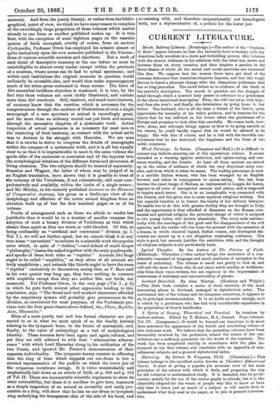Word Paintings. In Series. (Chapman and Hall.)—It is difficult to
extract any definite moaning out of this mysterious volume. It seems
intended as a warning against seduction, and opium-eating, and sen- suous worship, and the Jesuits. At least all these matters are mixed up in the series of tableaux of which the very disjointed story con- sists, and from which it takes its name. The leading personage in each is a terrible Italian woman, who has been wrohged by an English baronet, and taken in consequence to opium-eating. She has thus become the exact imago of Medusa, as represented in Loggia dei Lanzi, appears in all sorts of unexpected seasons and places, and is supposed to inspire much terror. She is in an inexplicable way connected with the Jesuits, and this gives rise to some mystical religious writing. But her especial function is to harass the family of her defunct betrayer.
To enable her to do this with greater facility they are brought to Italy, and the opportunity is thus afforded of diseonrse on the Roman cere- monial and spiritual religion, the principal charge of which is assigned to two young ladies, who lecture pleasantly. The story ends satisfac- torily with the marriages of the good and the disappearance of the evil agencies, and the reader will rise from the perusal with the sensation of a dream, in which classical legend, Italian scenes, and theological dis- cussion are mixed up in a not altogether unpleasing confusion. The style is good, but scarcely justifies the ambitions title, and the thought on religious subjects is not particularly fresh.






























 Previous page
Previous page